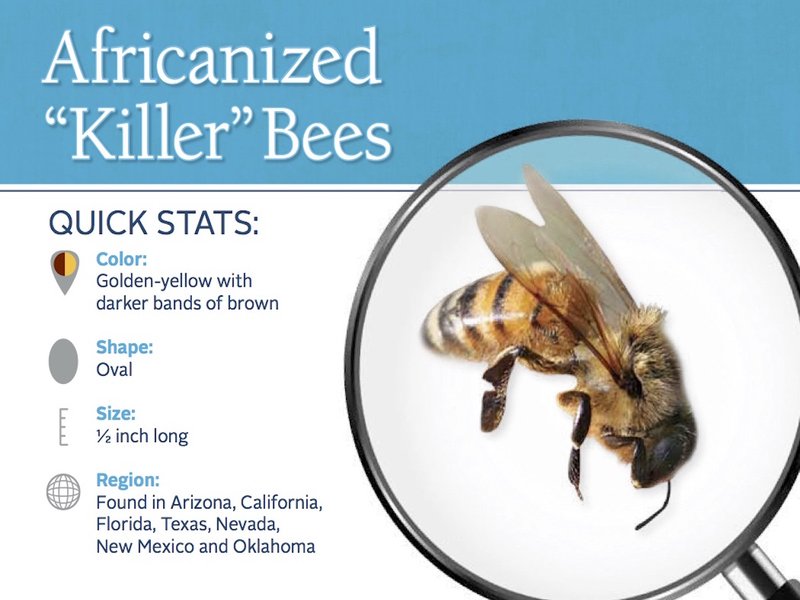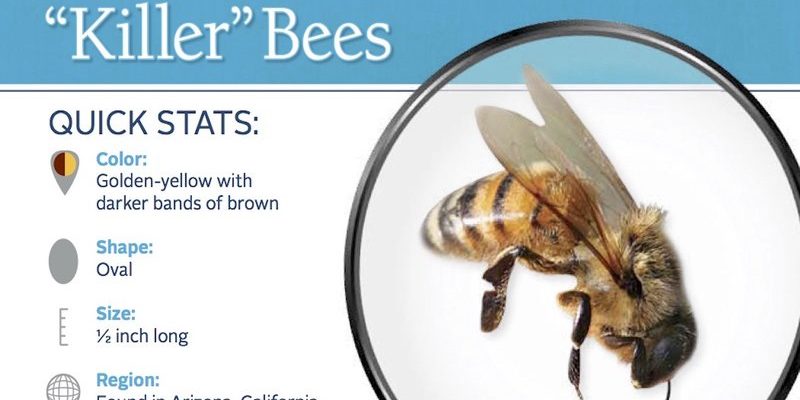
You might picture killer bees as relentless attackers, swooping down like a horror flick villain. But, here’s the thing: they’re just bees—albeit a bit more aggressive than your average honeybee. Understanding these differences can help demystify the wild world of killer bees and clarify why they might be getting a bad rap. So, grab your coffee, and let’s dive into some of the most common myths about Africanized bees!
Myth 1: All Africanized Bees Are Deadly
One of the biggest misconceptions about Africanized bees is that they are outright deadly. While it’s true that these bees can be more aggressive than their European counterparts, it’s not accurate to say they’re inherently lethal. Just like any animal, the behavior of bees really comes down to their environment and circumstances.
Let me explain: when a person gets stung, it can be an unpleasant experience, and in rare cases, it can even be fatal—especially for individuals with allergies. However, the overwhelming majority of stings from Africanized bees are no more dangerous than those from regular honeybees. In fact, many people can be stung multiple times without any serious consequence.
Africanized bees may defend their nests more vigorously, but that doesn’t mean they’re lurking around every corner waiting to attack. They react defensively when they perceive a threat, much like when a dog barks to protect its territory.
Myth 2: They’re Completely Different from Other Bees
You might be wondering if Africanized bees are an entirely different species, but that’s not the case. In reality, they are a hybrid of the European honeybee and the African honeybee. This means they share many characteristics with both parents.
In practical terms, this hybrid nature means they can be productive pollinators and honey producers just like other bees, and they play an essential role in our ecosystems. You know how sometimes blended coffee drinks can have the strengths of both blends? This is similar; Africanized bees have some traits that make them very resilient in certain environments.
However, don’t confuse their aggressiveness for a lack of honey production or pollination ability. Africanized bees can thrive in conditions where other bees struggle, making them surprisingly adept at their roles in nature.
Myth 3: They Will Chase You for Miles
Another common myth is that Africanized bees will chase a person for miles once they’re agitated. Honestly, this exaggeration can be traced back to sensationalized stories and movies. The truth is, while Africanized bees can be more persistent than regular bees, they won’t follow you across town just because you wandered too close to their hive.
In fact, bees typically defend their territory in a radius of about 150 feet. Once the perceived threat is gone, they usually return to their hive and get back to work. It’s kind of like a neighborhood watch: they’ll protect their own, but once the trouble leaves the area, so do they.
So, if you find yourself surrounded by bees, calmly walk away instead of running. You might feel like you’re in an action movie, but a slow exit is usually the safest route.
Myth 4: They Are Invasive and Will Take Over
When we think of “invasive species,” it often conjures up images of destruction and dominance. While Africanized bees have indeed spread throughout various regions, particularly in the Americas, labeling them as invasive species doesn’t tell the full story.
In their home regions, such as Africa, these bees have coexisted with local ecosystems for ages. They have adapted to thrive in those environments, just like many other species. The key here is that, while they might be more aggressive, they’re not inherently harmful to existing bee populations or ecosystems.
You can think of them as a strong coffee blend. It may be robust and bold, but that doesn’t mean it’s going to drown out milder flavors entirely. They can compete with and coexist alongside other bee populations—all while contributing to pollination efforts.
Myth 5: You Can Identify Them Easily
Many people believe that Africanized bees are easily identifiable based solely on their appearance, but that’s a myth. While there are some physical characteristics that can give clues—like their smaller size and slightly darker color—these bees can often look strikingly similar to European honeybees.
For the average person, distinguishing between the two just by sight is quite tricky. In fact, even trained experts often need to perform genetic tests to confirm whether a bee is Africanized. So, next time you see a bee buzzing around, don’t jump to conclusions about what type it is.
If you’re concerned about safety, it’s safer to treat any bee encounter with caution rather than trying to identify the species at first glance.
Myth 6: Africanized Bees Are Less Productive
You might think that with all this aggression and fear swirling around, Africanized bees wouldn’t be very good at their jobs. That’s not true! In reality, they can produce just as much honey as other honeybee species, if not more.
Their resilience and adaptability allow them to thrive in various environments, which can lead to larger colonies. These larger colonies can mean higher honey yields. So while they may be known for their aggressive behavior, Africanized bees also contribute positively to agricultural and honey production.
Think of it this way: a high-energy team in a workplace might be a bit rowdy, but they can also produce great results. Africanized bees bring that same kind of energy to their environments.
Myth 7: You Should Always Kill Africanized Bees
Finally, one of the most damaging myths is the idea that all Africanized bees should be exterminated. While it’s true that aggressive behavior can pose risks, simply wiping out a colony isn’t a viable long-term solution.
Instead of resorting to extermination, consider more humane alternatives. Educating communities on coexistence with bees can help reduce fears and prevent accidents. Instead of declaring war on a bee colony, it’s often better to relocate them safely when necessary. After all, bees play a crucial role in our ecosystems, and losing them would create more problems than it solves.
If we can show compassion and understanding towards these creatures, we can learn to respect their role in nature while keeping ourselves safe.
So there you have it—some of the most common myths about Africanized bees debunked! While they do have a reputation for being more aggressive, understanding their behavior and role in the ecosystem can help us break free from fear. Instead of viewing them as the enemy, consider them crucial players in our world.
By learning more about Africanized bees, we can coexist with them peacefully, respecting their place in nature while ensuring our safety. Knowledge is power, and now you have a better grasp of what’s real and what’s simply myth in the world of killer bees!

